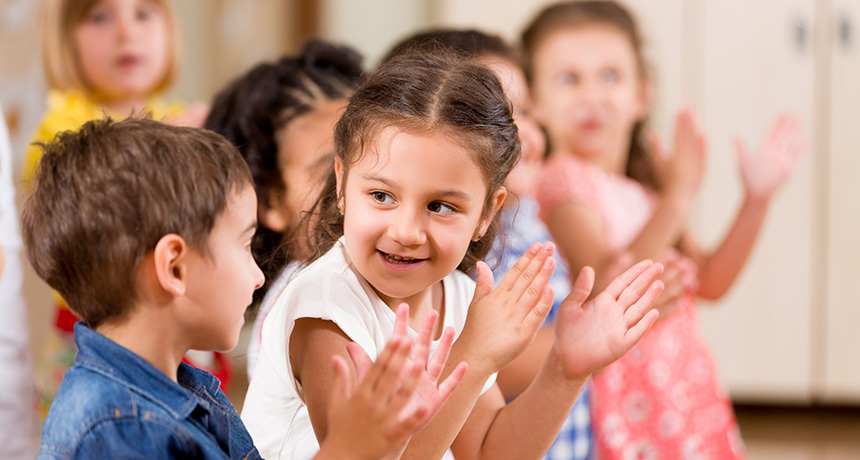A preschooler’s bubbly personality may rub off on friends

Happiness may be contagious among preschoolers, a new study suggests.
Fh Photo/Shutterstock
A preschool classroom is an ecosystem unlike any other. Scents of glue and snack time waft through the air. Bright, clunky art papers the walls. Fun-sized furniture makes visiting adults feel like awkward giants. In the name of science, a team of psychologists spent an entire year inside two such rooms, meticulously documenting changes in preschoolers’ personalities.
By the end of the year, the team had found that kids were sharing a lot more than runny noses with their friends. Preschoolers’ sunny dispositions may actually be contagious. Over the course of a school year, kids who hung out with happy, smiley friends took on more of these traits themselves, the observant scientists found. The results suggest that young children’s personalities rub off on their pals.
Psychologist Jennifer Watling Neal of Michigan State University in East Lansing and colleagues suspected that both inborn temperament and environment help shape kids’ outlooks. “We know that it’s probably a little bit of nature and a little bit of nurture,” Neal says.
Some evidence suggests that personality traits exhibited early in life stick around. Those cruel and entertaining marshmallow tests are a great example of this personality persistence: In a test of self-control, children who held out for an additional marshmallow (or, originally, a cookie) could still keep themselves in check 40 years later, a study found.
But of course, personalities aren’t carved in stone. They can shift, even through adulthood. “There’s more and more research coming out that personalities aren’t just ingrained,” Neal says.
In an ultimate Billy Madison move, Neal and colleagues went to preschool four days a week. Two trained teams of observers lurked in two classrooms (one class of 3-year-olds and one of 4-year-olds) and watched children during free-play time. One team monitored children’s temperaments, while the other focused on who each child was playing with.
At the year’s end, this careful scrutiny revealed that children’s positive emotions became more similar to those of their friends. Also catching was a trait called effortful control, a measure of how well a child works hard and stays on task, the researchers report February 2 in the Journal of Personality and Social Psychology.
Children’s friends didn’t affect their negative traits, such as sadness, fear or anger. But these emotions did seem to influence how social children were. Those who showed the most frequent negative traits were less likely to play with anyone. In contrast, happy kids tended to select happy playmates. “Personality shapes who you pick as a playmate, and also, your playmates shape your personality,” Neal says.
These personality shifts were noticeable to the researchers, who had boatloads of observations and statistical methods to sort through. It’s not clear whether the changes would be obvious to parents, Neal says.
When analyzed in different ways, the dataset may hold other clues to children’s personalities and social interactions — whether, for instance, the length of time in preschool matters for friendships. It’s possible that children who attend for half-day sessions might form different relationships than kids who attend preschool for the whole day.
By deeply observing preschoolers without parents lurking, the researchers caught a glimpse of something that, when you stop to think about it, is profound. They saw personalities being formed, by friends.







